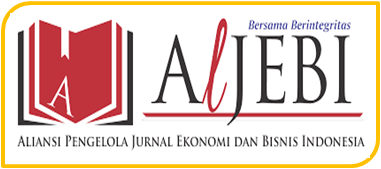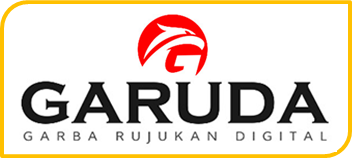Investigation of Umrah Travel Promotion: Does It Use the MLM System? Case Study from PT. Arminareka Perdana
Abstract
Keywords
Full Text:
PDFReferences
Aimee, R. M. (2019). A Thorough Literature Review of Customer Satisfaction Definition, Factors Affecting Customer Satisfaction and Measuring Customer Satisfaction. International Journal of Advanced Research, 7(9), 828–843. https://doi.org/10.21474/IJAR01/9733
Ardani, M., Setiawan, D., Munir, M. M., & Fitria, S. (2022). A Tale of Umrah Pilgrims Fraud in Indonesia: a Narrative Review Indicating and Anticipating “Fake Bureau.” Indonesian Interdisciplinary Journal of Sharia Economics (IIJSE), 5(1), 94–107. https://doi.org/10.31538/iijse.v5i1.1702
Asim, Z., & Sorooshian, S. (2019). Exploring the Role of Knowledge, Innovation and Technology Management (KNIT) Capabilities that Influence Research and Development. Journal of Open Innovation: Technology, Market, and Complexity, 5(2), 21. https://doi.org/10.3390/joitmc5020021
Bambang, A., Kusumawati, A., Nimran, U., & Suharyono, S. (2021). The Effect of Spiritual Marketing and Entrepreneurship Orientation on Determining Sustainable Competitive Advantage. Journal of Asian Finance, Economics and Business, 8(2). https://doi.org/10.13106/jafeb.2021.vol8.no2.0231
Bhat, S. A., Darzi, M. A., & Hakim, I. A. (2019). Understanding Social Marketing and Well-being: A Review of Selective Databases. Vikalpa: The Journal for Decision Makers, 44(2), 75–87. https://doi.org/10.1177/0256090919861010
Camilleri, M. A. (2018a). Strategic Planning and the Marketing Effectiveness Audit (pp. 117–135). https://doi.org/10.1007/978-3-319-49849-2_7
Camilleri, M. A. (2018b). Understanding Customer Needs and Wants (pp. 29–50). https://doi.org/10.1007/978-3-319-49849-2_2
Guest, G., & Fleming, P. (2020). Mixed Methods Research. In Public Health Research Methods (Issue February 2016, pp. 581–614). SAGE Publications, Inc. https://doi.org/10.4135/9781483398839.n19
Gundlach, G. T., & Wilkie, W. L. (2009). The American Marketing Association’s New Definition of Marketing: Perspective and Commentary on the 2007 Revision. Journal of Public Policy & Marketing, 28(2), 259–264. https://doi.org/10.1509/jppm.28.2.259
Hill, R. P., & Martin, K. D. (2014). Broadening the Paradigm of Marketing as Exchange: A Public Policy and Marketing Perspective. Journal of Public Policy & Marketing, 33(1), 17–33. https://doi.org/10.1509/jppm.13.023
Ismal, R., & Septiana, N. I. (2019). Islamic hedging for pilgrimage funds: case of Indonesia. Qualitative Research in Financial Markets, 11(3), 328–341. https://doi.org/10.1108/QRFM-11-2017-0101
John, E., Bueno, G., Lyra, F. R., & Lenzi, F. C. (2016). Knowledge Management, Market Orientation and Innovation : a study at a Technology Park of Santa Catarina. Brazilian Business Review, 13(3), 70–89. https://doi.org/http://dx.doi.org/10.15728/bbr.2016.13.3.4
Kotler, P. (2000). Marketing Management. In Marketing Management (Millenium). Pearson Custom Publishing. https://doi.org/10.1007/978-1-137-26638-5
Kotler, P., & Keller, K. L. (2012). Marketing Management Global Edition. Pearson Higher Education.
Kusumawati, A., Kumadji, S., & Farah Azizah, D. (2016). Community Based Marketing and Customer Live Time Value: an Analysis on Their Potential for Improving the Economy of East Java Province. International Journal of Social and Local Economic Governance, 2(1), 83–89. https://doi.org/10.21776/ub.ijleg.2016.002.01.10
Mary, M., Mediawati, E., Mediawati, E., Adirestuty, F., & Adirestuty, F. (2019). The Analysis of Third-Party Funds, State Sukuk, and Corporate Sukuk Towards Financial Deepening in Indonesia. Review of Islamic Economics and Finance, 2(2), 53–66. https://doi.org/10.17509/rief.v2i1.22158
Mishra, S. B., & Alok, S. (2017). Handbook of Research Methodology. Dimensions Of Critical Care Nursing, 9(1), 60. https://doi.org/10.1097/00003465-199001000-00018
Mulazid, A. S., Mufraini, M. A., Saharuddin, D., & Wicaksono, A. T. S. (2020). Attributes of Islamic Bank Service Quality: A Survey to Map Metropolitan Customer Satisfaction. International Journal of Business and Society, 21(2), 883–897. https://doi.org/10.33736/ijbs.3300.2020
Nwachukwu, C., & Žufan, P. (2017). Influence of Customer Focused Mission Statement on Customer Satisfaction. Acta Universitatis Agriculturae et Silviculturae Mendelianae Brunensis, 65(3), 1031–1038. https://doi.org/10.11118/actaun201765031031
Othman, B. A., Harun, A. Bin, & Nazeer, S. (2018). Issues and Challenges Faced by Malaysian Umrah Travel Agencies in Providing Excellent Marketing Mix Services to Umrah Pilgrims. The Journal of Social Sciences Research, SPI 2, 611–618. https://doi.org/10.32861/jssr.spi12.611.618
Purwaningwulan, M. M. (2021). Da’wah Messages as the Spiritual Marketing Approach of Islamic Fashion E-Commerce at HIJUP.COM. Komunika: Jurnal Dakwah Dan Komunikasi, 15(1), 125–137. https://doi.org/10.24090.komunika.v15i1.4696
Trinugroho, I., Risfandy, T., & Ariefianto, M. D. (2018). Competition, diversification, and bank margins: Evidence from Indonesian Islamic rural banks. Borsa Istanbul Review, 18(4), 349–358. https://doi.org/10.1016/j.bir.2018.07.006
Varadarajan, R. (2010). Strategic marketing and marketing strategy: domain, definition, fundamental issues and foundational premises. Journal of the Academy of Marketing Science, 38(2), 119–140. https://doi.org/10.1007/s11747-009-0176-7
Vasconcelos, A. F. (2011). Societal marketing concept and spirituality in the workplace theory: finding the common ground. Cadernos EBAPE.BR, 9(1), 96–115. https://doi.org/10.1590/S1679-39512011000100007
DOI: https://doi.org/10.18860/miec.v2i1.16739
Refbacks
- There are currently no refbacks.

This work is licensed under a Creative Commons Attribution-ShareAlike 4.0 International License.
Editorial Office:
Megawati Soekarnoputri Building
Faculty of Economics
Jln. Gajayana 50 Telp (0341) 558881
E-mail: m-iecjournal@uin-malang.ac.id
Universitas Islam Negeri Maulana Malik Ibrahim Malang
Member of:
Indexed by:
M-IEC Journal under a CC BY SA 4.0 International License.
View My Stats
























